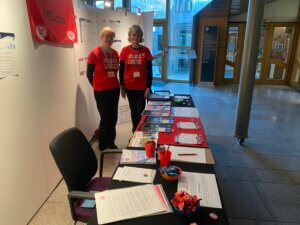A petition signed by 702 people was sent to Australia’s University of New South Wales (UNSW) Vice Chancellor Prof Ian Jacobs; the Mason Foundation; the federal health minister and the National Health and Medical Research Council (NHMRC) asking them to stop UNSW’s trial of an education module for health professionals.
The trial module treats chronic fatigue syndrome patients with graded exercise therapy and cognitive behaviour therapy (GET/CBT), despite the evidence showing these therapies have no benefit and may cause permanent harm.
UNSW’s Vice Chancellor’s office said they have received the petition and “the matter is under investigation.”
The trial registration says “despite GET and CBT being widely acknowledged as best-practice interventions for CFS, the great majority of patients in Australia are not receiving these appropriate evidence-based interventions. Recent studies have demonstrated that the reason for this documented gap between research and practice is largely due to practicing health professionals lacking the knowledge and skills to provide appropriate care.”
The trial registration does not specify which “recent studies” it is referring to. Also, it is not accurate to state that it is “widely acknowledged as best-practice.”
The trial poses an international risk, as UNSW plan to “disseminate the treatment to other centers nationally and internationally,” according to information the University provided to the National Health and Medical Research Council.
The NHMRC’s response acknowledges controversy but says that funding decisions are made by a peer review process.
In your letter, you have requested that the National Health and Medical Research Council (NHMRC) redirect funding from trials using Graded Exercise Therapy and Cognitive Behavioural Therapy for ME to biomedical research.
As the nation’s primary body for managing the investment in health and medical research, NHMRC is responsible for ensuring public funds are invested wisely and fairly to support the highest quality research. While not without controversy, open, transparent, high quality and contestable peer review is the best approach to assessing the quality of health and medical research and ensuring that only the best and most relevant research is funded.
In this context, NHMRC’s peer review process has been developed to ensure impartial and independent assessment focusing on the scientific and technical merit of applications by individuals with knowledge and expertise equivalent to that of the individuals whose applications for support they are reviewing. All applications are reviewed and awarded consistent with NHMRC’s internationally regarded peer review process. Research is required to be conducted in line with the application and within NHMRC’s ethical and legislative frameworks. Subject to these requirements being met, NHMRC does not influence the research path.
NHMRC is currently funding one active grant that includes an ME/CFS research component, which is Professor Andrew Lloyd’s Practitioner Fellowship. With regard to funding biomedical research into ME, NHMRC welcomes applications. Eligible researchers can apply for research funding through one of NHMRC’s many schemes. Eligibility criteria are published in NHMRC’s grant guidelines.
To be eligible to apply, researchers will need to work through an NHMRC Administering Institution. Further information on our Administering Institution policy is available at www.nhmrc.gov.au/grants-funding/administering-grants/administering-institutions. Details on funding opportunities, eligibility requirements and how to apply are available on the NHMRC website at www.nhmrc.gov.au/grants-funding/apply-funding.
I trust this information is of assistance.
The response from the Mason Foundation trustees:
Thank you for your email expressing concerns about the Judith Jane Mason and Harold Stannett Williams Memorial Foundation’s (“Mason Foundation”) involvement in medical scientific research.
As we explained to you earlier this year, the grant made to the University of New South Wales for medical research was made from private monies held in the Mason Foundation for which we act as trustee. The trustee distributes funds in accordance with the directions of the benefactor of the charitable trust. In many charitable trusts we are directed to make grants to medical research, and sometimes to specific fields of medical research. There are limitations placed on a trustee in the distribution of funds for charitable purposes that would not apply to an individual or to another type of company. The trustees are not at liberty to impose their personal views or values in respect of distributing money that is held in trust. We must comply with these directions in order to fulfill our legal duty as trustee to the benefactors who left these funds in our care.
As trustee our duty is to act impartially between beneficiaries and in order to do so we utilise and respect the advice of experts in the arena of medical and scientific research. The Mason Foundation makes use of a specially convened panel of scientists from a range of prominent medical institutions to provide advice on the quality and value of the scientific research proposal. We only fund projects that have approval from their University or Institute, and we rely on those organisations to make judgements on and maintain appropriate standards.
Thank you for signing and supporting the petition. More details about the petition and responses at MEAustralia.net.
For updates, follow @sashanimmo on Twitter.





